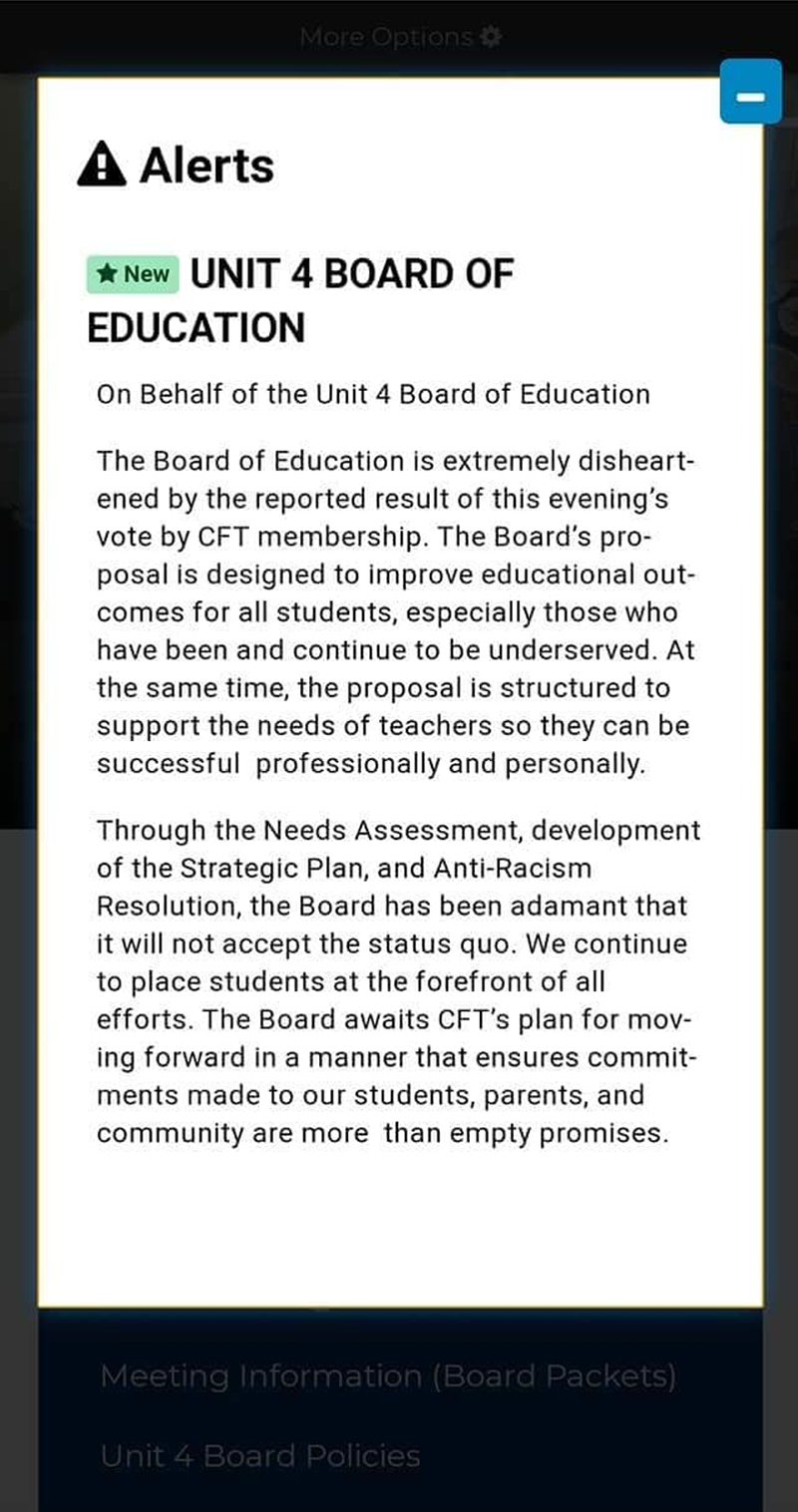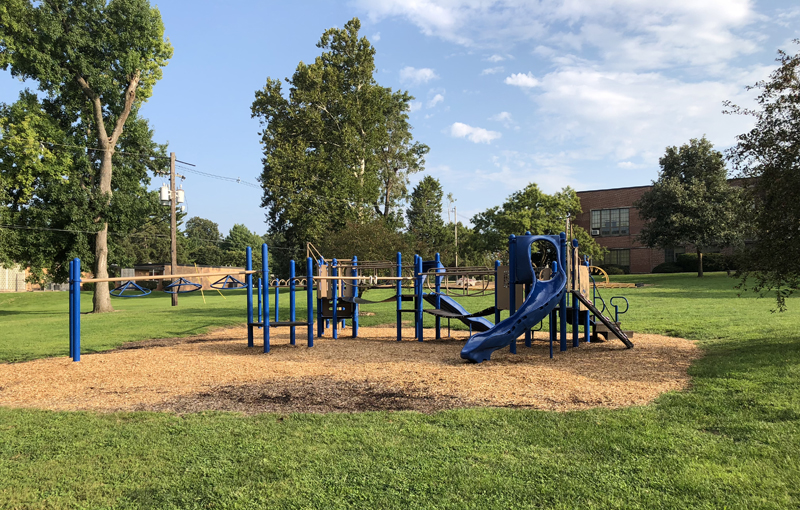If you follow local news and politics in Champaign, you have probably heard about the stalled contract negotiations between Champaign Unit 4 Schools and the teachers’ union, the Champaign Federation of Teachers (CFT). Champaign Unit 4 teachers have been working without a contract since June 2021. Negotiations have failed primarily due to the Board of Education’s desire to extend the school day by 50 minutes beginning Fall 2023. On January 26th, CFT voted to authorize a strike with an overwhelming 91% of the 733 who voted. This does not mean that they will strike; another vote would be needed for that to happen. The impasse over the extended teaching day epitomizes the serious, deeply rooted problems with communication between the administration and teachers.
Effective and clear communication requires trust, patience, and empathy from all involved parties. In the conversations about the new contact for Champaign teachers, specifically about the extended school day, the Board has displayed little trust, patience and empathy, at least publicly. Take, for instance, administration’s response to CFT’s vote to authorize a strike, posted as a pop-up alert on the district’s website right after the vote:

Screenshot from Unit 4 website.
There doesn’t seem to be a very good reason to post an alert like this, especially when considering all of the very serious problems the district has encountered in the last few months: gun violence on school property and busses, problems with bussing and students being dropped off at the wrong stops, and the spread of COVID-19 through the schools. Imagine, for a moment, that you are someone applying for a job at Unit 4, and when you open the website to try to learn more about this community you’d like to join, you see this message disparaging district teachers.
The Board’s messaging is condescending and dismissive of the hard work Champaign teachers have been putting in every single day — without a contract and in an ongoing pandemic. Teachers are missing their breaks to cover the needs unmet by illness and quarantine. They are addressing the social, emotional, and educational needs of students who haven’t had a “normal” school year since academic year 2018-2019. Our society has and continues to endure the trauma of this pandemic, but the Board seems to express little empathy, understanding, and adaptation to this new reality.
In part, both the Board and the teachers have been working in survival mode for too long. Everyone is exhausted, including students. Working under constant duress breaks down abilities to zoom out to see the larger picture, and steals the time and space for careful reflection and consideration. But the teachers have been telling everyone what the conditions are like on the ground, in the virtual and analog classrooms. The Board is either not listening, or ignoring teachers’ pleas. Board members are not in classrooms everyday. They don’t experience anything close to what the teachers are experiencing in their workplaces. It’s the responsibility of the Board to take teachers at their word. Teachers are not exaggerating.
According to the Board, the desire to extend the school day is a means to close the opportunity* gap between Black and white students. That is a worthy and critical issue that needs to be addressed. However, the Board’s messaging around this issue is muddled and not wholly convincing. They’ve also indicated the need to give elementary kids longer recess and lunch. That’s a lot of expectation on what can be done with an extra 35 minutes, without many details on how this will impact teachers and parents. Per the CFT:
We fear that the extended day, like many other initiatives in this district, will follow a predictable path– from the promise of the theoretical to the logistical constraints of practice. Refusal to proactively address the impact of an extended day on current staffing and logistical issues, which are arguably more severe than ever, currently prevents a path toward agreement.
It is in these details that everything happens: when students board a bus to get to school, when teachers can use the restroom and have planning time, how those extra minutes will be specifically maximized for student benefit, while not overextending an already strained teaching staff. As the CFT has stated, they are looking to the Board for more guarantees and specificity about the practical and logistical implementation of this proposed policy. It is not enough to say “we’ll figure it out when we get there.” The teachers — and the parents and guardians of these students — deserve more information.
We understand that the Board has criteria by which the district and their elected positions are measured, that there are state and federal standards that determine funding. All of that is important and critical when considering their motivation. The opportunity gap between Black and white students does need to be closed. But isn’t it worth asking the teachers, who are teaching both Black and white students, what is and isn’t working in the classroom?
In Unit 4, more than 69% of Black students are considered low income. We know that socioeconomic status and poverty levels affect opportunity gaps in schools. This is not new research. The Educational Opportunity Project at Stanford University has an excellent tool that helps illustrate this point. When you look at the percentage of students who qualify for free and reduced lunch with the average test scores (compared to the U.S. average), you will see that a lower percentage of free/reduced lunch, correlates to a higher average test scores for Champaign schools. For instance, Barkstall has 42.7% free/reduced lunch, and is +1.16 higher than the U.S. average for test scores, while Garden Hills has 80% free/reduced lunch and is -1.32 below the U.S. average. What is the Board proposing to address this particular data point?
This is a time when parents feel especially disconnected from their children’s schools. Normal school social events and parent-teacher conferences are not happening, at least not to the extent that they were pre-pandemic. Parents are not going in and out of the schools as frequently, missing out on casual, rapport-building interactions with faculty and staff. This is precisely when clear, decisive, and timely communication is critical. Transparency is essential. In these circumstances, it’s paramount for the district to go above and beyond to communicate with parents/guardians about what is going on, and any plans for changes in what is “normal.”
This is not the first time that the Board and the CFT have had difficult contract negotiations. Negotiations were stalled in 2018, too. As outside observers, it feels like Champaign teachers are working without contracts more than they’re working with them. That is a systemic problem that needs to be fixed with careful, thoughtful, and probably painful discussions. We believe that all parties involved are trying to do their best, in the best way they know how. We do not believe that any single member of the Board is a malicious actor, or that the Board is set on doing harm. But it is incumbent on the Board to find a way to solicit and incorporate the feedback the teachers (and parents, for that matter) are providing, to work with the teachers to arrive at a reasonable place. The trust and respect needs to be restored, otherwise more teachers will continue to leave the district or the profession, and that’s bad for our kids.
The Editorial Board is Jessica Hammie, Julie McClure, Patrick Singer, and Mara Thacker.








